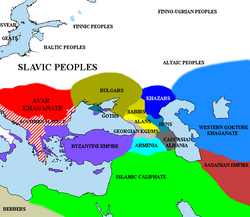Great Bulgaria
| Old Great Bulgaria | ||||||||||||||||
|
||||||||||||||||
|
Old Great Bulgaria
|
||||||||||||||||
| Capital |
Phanagoria (632–665) |
|||||||||||||||
| Languages | Bulgar | |||||||||||||||
| Religion | Paganism (Tengrism) | |||||||||||||||
| Government | Absolute Monarchy | |||||||||||||||
| Khan | ||||||||||||||||
| • | 632–665 | Kubrat | ||||||||||||||
| • | 665–668 | Batbayan | ||||||||||||||
| Historical era | Middle Ages | |||||||||||||||
| • | Kubrat inherits the throne | 632 | ||||||||||||||
| • | Batbayan inherits the throne | 665 | ||||||||||||||
| • | Old Great Bulgaria is conquered by the Khazars | 668 | ||||||||||||||
|
||||||||||||||||
| Today part of | ||||||||||||||||
Old Great Bulgaria or Great Bulgaria (Byzantine Greek: Παλαιά Μεγάλη Βουλγαρία, Palaiá Megálē Voulgaría), also often known by the Latin names Magna Bulgaria) and Patria Onoguria ("Onogur land"), was a 7th Century state formed by the Bulgars and Onogurs on the western Pontic Steppe (modern southern Ukraine and south-west Russia). Great Bulgaria was originally centred on Phanagoria, between the Dniester and lower Volga, (in modern Krasnodar Krai, Russia).
In the mid-7th century, Great Bulgaria expanded west to include Avar territory and was centered in Poltava. During the late 7th century, however, an Avar-Slavic alliance in the west, and Khazars in the east, defeated the Bulgars and the Great Bulgaria disintegrated. Successor states included the First Bulgarian Empire and Volga Bulgaria.
The etymology of the ethnonym is not completely understood and difficult to trace back earlier than the 4th century AD. It is generally believed to derive from the Turkic verb bulğha (to "stir", "mix", "disturb", "confuse"), possibly suggesting that other Turkic peoples regarded the Bulgars as a "mixed" people, and/or "rebellious".
Later Byzantine scholars implied that the Bulgars had previously been known as the Onogurs (Onoğur). Agathon wrote about the "nation of Onogur Bulğars", Nikephoros I stated that Kubrat was lord of the Onogundurs, Theophanes referred to them as Onogundur–Bulgars and Constantine VII remarked that the Bulgars formerly called themselves Onogundurs. Variations of the name include: Onoguri, Onoghuri, Onghur, Ongur, Onghuri, Onguri, Onogundur, Unogundur and Unokundur. There are several theories about the origin of the name Onogur. In some Turkic languages on means "10" and ğur "arrow"; and "ten arrows" a federation of ten tribes, i.e. the Western Turkic Khaganate. Within the Turkic languages, "z" sounds in the easternmost languages tend to have become "r" in the westernmost Turkic languages; therefore, the ethnonym Oghuz may be the source of Oghur; that is, on Oğur would mean "ten clans of Oghuz".
...
Wikipedia

